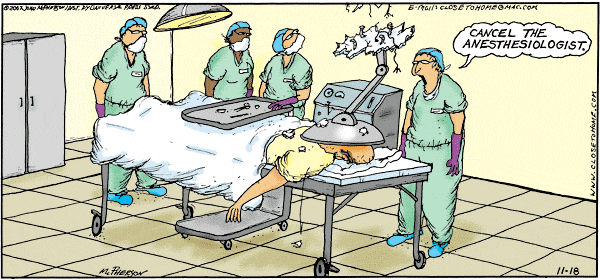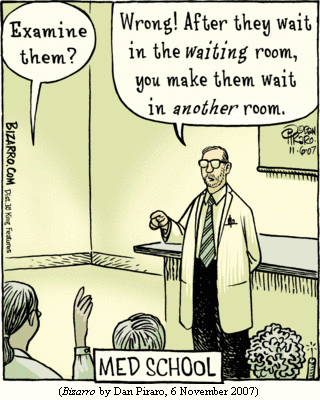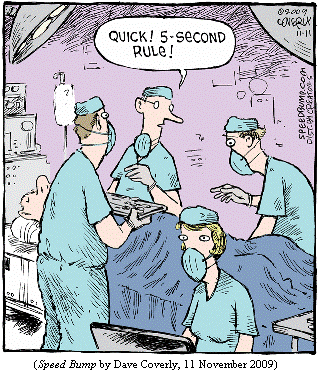
|

|

|

|
TACTICS OF DELAY: So when last issue left off, Donna had seemingly lucked into a surgery date of Monday 8 February, instead of having to wait until 26 February as originally proposed. But then she'd been told she had to get an echocardiogram before she could have the operation—a decision made by the anesthesiologists at the Hospital for Joint Diseases. (When you're in surgery under general anesthesia, the anesthesiologist is maintaining all of your body functions, including breathing and pumping your blood; hence the anesthesiologist has ultimate veto power over surgeons, cardiologists and everyone else.) What they were looking for was related to some readings they'd taken during the last surgery in October, which may have indicated dangerous weaknesses in Donna's heart, or may have been side effects of the amount of blood she lost during that surgery; the results, we were told, would affect the techniques and drugs to be used during this surgery.
What was making things difficult was that the anesthesiologists had already signed off on Donna's surgery when she was at the hospital for her pre-op certifications. Had they asked for an echocardiogram then, she could have gotten one on the spot. Instead, they waited until she was home, rescinded their approval, and called the next afternoon. That was Thursday afternoon, 4 February. The echocardiogram, if done outside the hospital, needed (per our health insurance) to be prescribed by our doctor, whose office was already closed for the day when we got the call from the hospital. We couldn't get hold of the doctor before Friday morning, and it turned out Donna's cardiologist's office was closed that Friday, as well as (of course) Saturday and Sunday. The surgery appeared in jeopardy. But the surgeon's office manager, Naida, made some calls and finally reassured us that if we could get to the hospital by 8:00 Monday morning, they could do the echocardiogram in the morning and then operate at noon.
Through superhuman efforts, we actually made it to the hospital at 8:00 Monday morning. After I'd gotten through the trauma of writing a check for our copay plus Donna's maximum out-of-pocket for the year, all of which the hospital demanded in advance, we proceeded into the admitting area, where after the usual interrogations and blood sampling, we were eventually informed of a tiny snag: the technician in charge of performing echocardiograms at this hospital is scheduled to arrive every day at 3:30, no earlier. Over the next few hours, the surgeons and cardiologists pleaded once more with the anesthesiologists to let them go on with the surgery—no dice-and assorted administrators sought a way to get the echocardiogram done before late afternoon—likewise no dice.
 Eventually, all concerned had to acknowledge the futility of the situation. The surgery was not going to get done Monday. Dr. Slover's staff made arrangements to get Donna admitted, figuring that she'd get the echocardiogram, the anesthesiologists would give their OK, and the surgery would be done the next day. Donna settled into her room and the rest of us went home. That afternoon, technicians did both an echocardiogram and a regular cardiogram on her—don't ask me what the difference is—and we all went to bed believing she'd be operated on on Tuesday.
Eventually, all concerned had to acknowledge the futility of the situation. The surgery was not going to get done Monday. Dr. Slover's staff made arrangements to get Donna admitted, figuring that she'd get the echocardiogram, the anesthesiologists would give their OK, and the surgery would be done the next day. Donna settled into her room and the rest of us went home. That afternoon, technicians did both an echocardiogram and a regular cardiogram on her—don't ask me what the difference is—and we all went to bed believing she'd be operated on on Tuesday.
Tuesday morning I called to find out just when the operation was scheduled for, and Donna said they'd just told her it was not going to happen that day either. The word had come down from the anesthesiologists that they wanted another test before they'd clear Donna for surgery, a stress test. Naturally, there was no explanation why they'd suddenly thought of that at this point.
Now, a stress test is usually not difficult to administer. It requires the patient to get on a treadmill and walk, then run, at an increasing pace for a certain length of time, stressing the heart, while assorted sensors stuck to the body take readings. For a patient who can't walk, let alone run, it's a little harder. The stress is chemically induced, by injecting a drug which essentially makes the heart race. Conditions have to be more carefully supervised for this version of the test. The HJD, it turns out, does not have a facility for performing this test. Its sister hospital, NYU Medical Center, 16 blocks further north, does. So Donna's medical management team spent the rest of Tuesday making arrangements to get Donna a stress test at NYU Medical Center, with transfers by ambulance in both directions. Naturally, the earliest it could be arranged was Wednesday morning.
At this point I'd had two (unpaid) days off work for the surgery, and Donna'd had no surgery. I was beginning (?) to get skeptical. So I went in and worked a regular day on Wednesday, with Ethan on alert to run to the hospital and provide moral support until I could get there in case they actually started prepping Donna. It turned out (big surprise) to be unnecessary. The ambulance got Donna, and the intern who was accompanying her, to NYU Medical Center punctually at 9 am, and the test went off successfully (and revealed no new problems); but the ambulance took four hours to show up for the return trip to HJD. I don't know whether anyone had in fact ever seriously planned to operate on Donna that day, but of course it was too late by then.
Wednesday evening, Donna was alternately visited by doctors and nurses who told her she'd get her new hip on Thursday, and others who said that no, it wasn't going to happen for the rest of the week, and she'd best prepare to go home for the holiday weekend. The second group finally proved correct, although the confirmation didn't come until mid-morning. We decided that after all the time of ours the hospital had wasted, it could cool its heels for a few hours. Ethan and I went up after work and got Donna home on Thursday night, 11 February. We were told to bring her back Tuesday morning around 10:30.
It's at this point that I got my turn as a medical victim. ("You'll get your chance to go to the hospital; just be patient.") I felt a bit tireder than usual on Friday, but blamed it on the stress of the week. I slept poorly Friday night, owing to a general but ill-defined achiness and a continuing need to sit up and belch. I didn't have much appetite or energy on Saturday, and found myself almost entirely unable to sleep Saturday night after a fit of uncontrollable shivering and a fever of 102° F. Sunday morning I figured enough was enough, and it was time to see my doctor (who has Sunday hours thanks to having his office in a heavily Orthodox neighborhood). Another shivering fit delayed my departure, but somehow I got there, waited in the waiting room for an hour and a half (the down side of having Sunday hours in a heavily Orthodox neighborhood), and proceeded to have another shivering episode in the examining room. I also apparently dozed off or zoned out; the next thing I knew, my doctor had a couple of EMTs there to take me to the emergency room at Methodist in Park Slope. He suspected a lung infection, but mostly figured I needed more diagnosis than he could do. I'm told I was speaking and walking unsteadily, but I don't remember that.
I'd been asked if I could come in for some overtime on Monday morning, though the office would be nominally closed for Washington's Birthday Observed. I had the presence of mind to call the supervisor in charge of the project as I was in the ambulance and tell her I didn't think I was going to be able to make it. I also called home, as I thought the developments might be of some interest.
The ER people at Methodist took their time giving me a host of tests—blood, urine, X-rays, cardiograms, probably a few I don't remember—and failed to find any evidence of a lung infection, or much of anything else they could treat. Their conclusion: a fairly nasty but otherwise undetermined virus. (Not flu, they said.) They did say I was vastly dehydrated; odd, because I'd been very thirsty, and drinking water, iced tea and ginger ale at every opportunity. Long story short, they decided to give me a couple of liters of IV saline and send me home. They didn't give me any drugs, but said I should take Tylenol to keep the fever down.
Ethan had canceled a Valentine's Day date to meet me at the hospital, and he drove me home at about 3:30 am. I slept much better then, and woke up feeling better, though still not 100%. The fever was way down, and pretty much faded out in the subsequent day, but I don't think I'd have been a lot of help if I'd tried to come to work at 10 am Monday.
 So then it was Tuesday, and with a great sense of déjà vu, we brought Donna back to the hospital. There were no new roadblocks from the anesthesiologists this time, only the usual bureaucratic delays. Donna finally was wheeled off to the O.R. at 2:40 pm. Ethan went off to put in a short day at work; I went out to lunch and (it being too snowy to enjoy a walk) came back and waited. And waited. At a quarter to 10, while I was in the recovery room asking if there was any word of Donna, Dr. Slover the surgeon found Ethan in the waiting room and told him the operation was done.
So then it was Tuesday, and with a great sense of déjà vu, we brought Donna back to the hospital. There were no new roadblocks from the anesthesiologists this time, only the usual bureaucratic delays. Donna finally was wheeled off to the O.R. at 2:40 pm. Ethan went off to put in a short day at work; I went out to lunch and (it being too snowy to enjoy a walk) came back and waited. And waited. At a quarter to 10, while I was in the recovery room asking if there was any word of Donna, Dr. Slover the surgeon found Ethan in the waiting room and told him the operation was done.
Like the previous surgery in October, it was long and stressful; the doctor said each successive surgery at the same site tended to be more difficult. Donna had taken three pints of blood, and had ended up with fluid in her lungs, so they had intubated and sedated her until the morning. We waited until they brought her out to the recovery room, talked to her briefly (with no way of knowing if she could hear or would remember it), and went home.
Donna was extubated and allowed to return to consciousness Wednesday morning, and was in intensive care until Thursday afternoon, when she was moved to a regular room. She continued under fairly substantial pain medication, which kept her fairly groggy. On Monday—that would be the 22nd—she told me that the social worker had visited her and hinted that she might be released to the nursing home for rehab as soon as the next day. Donna now says she has no memory of such a visit, and wonders whether she hallucinated it; in any case, the hoped-for outcome was not to be. As the medication was dialed down, Donna was reporting more pain than was expected at that stage in her recovery, and Dr. Slover started to be concerned. He sent her down for some X-rays on Monday, some more on Tuesday, and a third set on Wednesday; the last time, he went with her and personally positioned her hip at the angles he wanted to see. He explained that after the surgery, it takes time for the bone tissue to grow around the prosthesis and anchor it in place, and he was afraid that the as-yet-not-fully-anchored prosthesis had gotten dislocated in the week since the surgery, through the stress of the minuscule amount of walking the nurses had encouraged Donna to attempt in that time. (He didn't say why, if the prosthesis is that unstable at that stage of the process, they encourage walking on it.)
On Thursday, having apparently completed his analysis of the situation, Dr. Slover told Donna that he was going to operate on her one more time, the very next day. So I arranged to take Friday off, got there about 11:30 in the morning, stayed with Donna as they wheeled her down to the surgical holding area and then left her waiting for an hour and three-quarters, wished her luck as they wheeled her in to the O.R., went out for some lunch and then returned to the waiting room to wait. Dr. Slover came in a mere four hours afterward, to tell me that the operation was over. He said the cup—the part of the prosthesis that was embedded in the pelvis—had gotten shifted out of position, and he'd fixed it and put in some more screws to hold it in place better. He did not think that Donna's attempts at walking had caused the problem—but he didn't say what he did think had caused it, if indeed he had formed any hypotheses.

Donna notes, by the way, that this last surgery was performed on 26 February, the day that had originally been chosen for the hip reinstallation. I think I hear the ghods laughing just offstage.
Unlike after the previous two operations, Donna was not intubated and sedated overnight. I spoke with her in the recovery room and she was pleased to be awake (if still groggy with the pain medication) and done with the operation. She was moved later that evening, not to the ICU, but to the so-called ICU step-down unit, and two days later to a regular room. A mere five days after that, on Friday 5 March, the hospital let us know she was to be transferred out for rehab.
That engendered a whole new round of hassle, as the rehab center where Donna spent six weeks in the fall, and which she was pretty happy with, didn't have any available beds at that point, and wasn't expecting to for nearly a week. Donna was once again given a list of six to choose from, but then the social worker picked one for her while I was trying to research them. The facility in question was adamant that Donna arrive by 5 pm for proper check-in, so Ethan ran over to the hospital at 3 to help her pack. The hospital then delayed her departure for a few more hours, and the ambulette service contributed a few delays of its own. The upshot was that Donna took a very scary ride over the Manhattan Bridge—the ambulette's wheelchair securement devices turned out to be not all that secure—and arrived at the Ditmas Park Rehab/Care Center around a quarter to 7. She's there now, and will likely stay there, receiving physical therapy and occupational therapy, for a few more weeks, until our health insurance decides she's gotten all the benefit she can from being there, and sends her home.
 Comments on APA-NYU, Volume 8, #2 (e-APA-NYU #70)
Comments on APA-NYU, Volume 8, #2 (e-APA-NYU #70)
I've been feeling pretty exhausted and not very sociable over the past month for some reason, but if Donna's mending well and ensconced in the rehab facility, I just might make it up to Lunacon and see if the newly de-Escherized Hilton seems any less fannish. (The extra dose of daylight starting in a week or so will probably do me a lot of good.) Let's all keep hanging on until spring...
>Portions of the preceding will not be carried, no matter which cable company you switch to.<